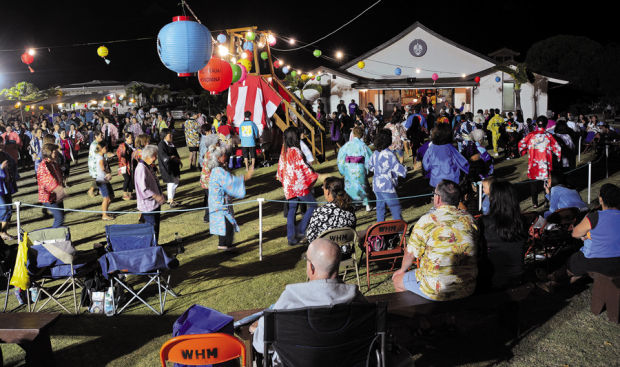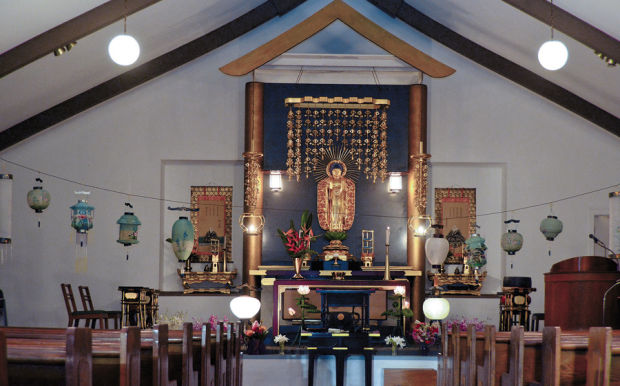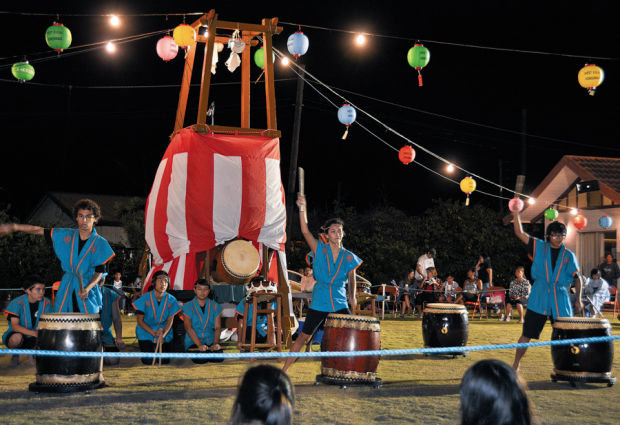WAIMEA — The pair of teru teru bozu smiled as the ring filled with dancers over the weekend in Waimea Valley. Teru teru bozu is described as a traditional handmade doll created out of white paper, or cloth, which supposedly
WAIMEA — The pair of teru teru bozu smiled as the ring filled with dancers over the weekend in Waimea Valley.
Teru teru bozu is described as a traditional handmade doll created out of white paper, or cloth, which supposedly has magical powers to bring good weather.
The pair, suspended from a perch atop a central wooden tower, quietly smiled as taiko resonated off the valley walls and mingled with the aroma of cooking food wafting in the cool Waimea night air.
Obon dance season on Kauai was officially launched with the first bon dance at the West Kauai Hongwanji, Waimea Temple over the weekend.
Obon is a traditional Buddhist custom honoring the spirits of one’s ancestors. Celebrated in Japan for more than 500 years, the custom has evolved into a family reunion holiday during which time people return to ancestral family places to visit and clean their ancestors’ graves.
It is a time when the spirits of ancestors are supposed to revisit the household altars and during the three days when obon is observed, always includes a dance known as bon-odori.
Arriving in Hawaii with the first Japanese immigrants who were brought to the islands to labor on the plantations, the custom quickly became a part of plantation lifestyle because of the camaraderie of neighbors, family and friends coming together for food and fellowship.
Buddhist churches established in Hawaii capitalized on the event as a fundraising arm, offering a variety of food and activities.
The custom stems from a Buddhist disciple who looked on his deceased mother and discovered she was suffering in the Realm of Hungry Ghosts.
Troubled, he approached the Buddha for help. The Buddha instructed him to make offerings to the Buddhist monks who had completed their summer retreat on the 15th day of the seventh month.
On doing this, he saw his mother released from suffering. He also started to see the true nature of her past unselfishness and the many sacrifices she made for him.
This filled him with joy and he began dancing with happiness and joy, the start of the bon-odori.
According to online sources, the bon season is an important part of the present-day culture and life of Hawaii. Many temples hold a cultural and food bazaar providing a variety of cuisine and art as well as displaying features of Japanese culture and Japanese-American history, the presentations being influenced by the communities and lifestyle.
Roy Miyake, Kauai Museum volunteer, and Chris Faye, museum curator, jointly hosted an identification presentation where the public was invited to identify people in four photographs Miyake received of Issei, or first generation Japanese, in a Colorado internment camp.
Alton Miyamoto of the Kauai Buddhist Council, host of the Kauai series of bon dances, said the next obon celebration will be this weekend at the Kapaa Hongwanji Mission with the bon services starting at 6 p.m. and dancing to start shortly before 8 p.m.
Waimea Higashi Hongwanji will host its bon dance on June 21 and 22, the Hanapepe Soto Zen Temple will host bon dance on June 28 and 29.
Koloa Jodo Mission will be the site of the July 5 and 6 bon dance followed by the West Kauai Hongwanji, Hanapepe Temple on July 12 and 13.
Lihue Hongwanji Mission hosts bon dance on July 19 and 20 followed by the Waimea Shingon Mission hosting its bon celebration on July 26 and 27. The final bon dance of the Kauai Buddhist Council calendar will be on Aug. 2 and 3 at the Kapaa Jodo Mission.
In addition to the Kauai Buddhist Council schedule, the Kauai Museum will host its Japanese festival on July 6 with a mini version of the bon dance starting at 1:30 p.m.
On Aug. 16, the Kauai Veterans Memorial Hospital will host a community gathering at its bon dance for the benefit of its residents who otherwise would not be able to attend the event.
The Kauai Veterans Council will debut its bon dance on Aug. 30 and 31 at the Kauai Veterans Center on Kapule Highway in Lihue.
For more information on any of the bon dances, contact the respective churches listed in the white pages of the telephone book.
• Dennis Fujimoto, photographer and staff writer, can be reached at 245-0453 or dfujimoto@ thegardenisland.com.




